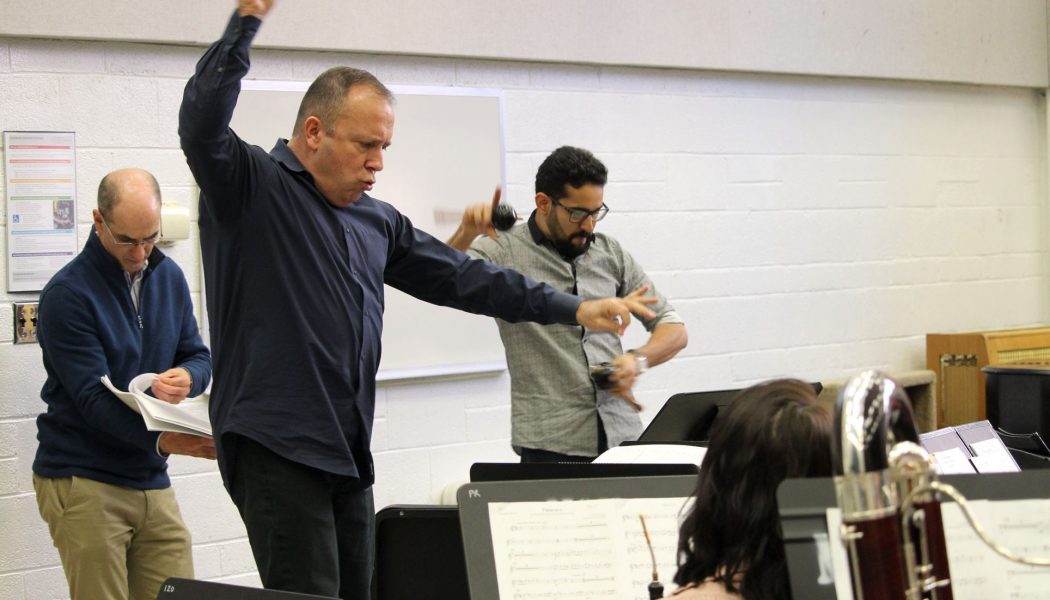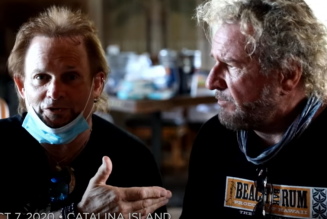
It’s not often college music students get recognized by the Latin Recording Academy, much less the Wind Symphony ensemble, which means this type of recognition “legitimizes what we do,” says Sedatole.
But more than that, adds Lorenz, “we’re bridging the gap [between cultures], especially in a state like Michigan where the Latino voice is not heard, although I know it’s there. It shows the world that the Latin culture is alive and well, even here in the middle of Michigan.”
MSU is located in East Lansing, Mich., where there’s a population of a little over 48,000, according to the census, and 4.8 percent of the population is Latino. At least five out of the 50 members in the ensemble are Latino, says Lorenz, so for most of the musicians, “This is their first connection they may have had with anything Latin,” he adds.
King Mangoberry is a suite of music for wind symphony that includes recordings written by Lorenz that date back 20 years. That’s the case for “Pataruco,” the nominated 16-minute song led by the sound of maracas. Another track on the album is titled “El Muro” and had been performed by the ensemble back in 2009. “I knew then that once Ricardo had enough wind band music that we would make a disc of this,” adds Sedatole, who’s known Lorenz for 15 years.
Days before the Latin Grammys awards ceremony on Nov. 19, Billboard spoke to Lorenz and Sedatole about the inspiration behind King Mangoberry and what this type of recognition means to them and their students.
First of all, congratulations! What was yours and the students’ reaction when you found out you were nominated for a Latin Grammy?
Kevin Sedatole: I was shocked, but I think the disc is great. The students are very excited. Unfortunately, we don’t get to see them right now, so not being able to celebrate with them face to face is a little awkward, but at some point, we will, whatever happens. But it’s such an honor for a student-based ensemble to be nominated for something of this prestige, that’s pretty cool.
Ricardo Lorenz: I find it absolutely inspiring that the project has been recognized by the top entity of the Latin recording industry. Most of the people on this recording aren’t Latinos, so we’re bridging that gap, something that I’ve been trying to do for many years now. The Latino culture is everywhere, even in places we don’t expect to find it. This is a great example of that.
The album is a homegrown project made possible by collaborating with the university’s community and beyond. Even local seventh- and eighth-grade students from Chippewa Middle School in Okemos, Mich., were involved in the making of this album since they created the artwork for it. What’s the story behind the design?
Lorenz: The idea of broadening the reach of the music itself really came from my son. He’s now 14, and 12 then when this started. The fact that King Mangoberry exists is because it had to do with the imagination of my son. Then him and his classmates helped me figure out a series of characters based on this idea of hybridity between two fruits and vegetables that don’t belong together. My son thought it would it be a great idea if his class took on this project, of course with the teacher’s permission. I thought, “These kids won’t want to do this. They’re doing other hip things like playing video games.” But they thought it was one of the most interesting art projects they’ve done. We had 80 drawings from seventh- and eighth-graders. They made connections I hadn’t even made.
Did you think King Mangoberry would have this type of impact?
Lorenz: I didn’t think it was going to reach to the very top to get the attention it’s getting. It was a very high-quality product, both in the performance and the music I wrote. But then it all made sense because by bringing an artist like Manuel Alejandro Rangel, who is recording with all the top Caribbean artists as the maracas player, it caught the attention of the industry and those who are recording constantly. We’re not; we’re teaching. He’s out there in the trenches of recording constantly, so I thought, “Well this makes sense that this happened.” But we weren’t expecting it.
“Pataruco,” a track featured in King Mangoberry, is up for best classical contemporary composition. Ricardo, you wrote the original version of that 20 years ago. What does it mean to get recognized years later for this evolved version?
Lorenz: It’s a great feeling for a project that is 20 years old to be recognized at this level. The maracas is an instrument that deserves to be as appreciated as a piano, a violin, a clarinet, and it has taken 20 years to slowly rise to that level of attention.
It’s not so often that we get to see a college orchestra get nominated for a Latin Grammy. Do you hope this opens doors for other schools in some way?
Sedatole: I hope so. There are some fantastic projects that colleges are doing all over the place. It’s important to get recognition for college students, particularly in the band/wind ensemble area. It legitimizes what we do. We’re always trying to get from under the umbrella of orchestra and we’re our own entity. Getting a recognition like this pushes us way down the road. If we get this, it’s going to be a big deal.
What does this recognition mean to you both and, more broadly, what does it mean for MSU to now have this connection to the Latin world?
Sedatole: Personally, it’s more about the students and what they’ve gotten to experience through a collaboration like this, learning about a different culture and their interaction with Ricardo and Manuel — by far the most important aspects of this. It’s going to have a long-lasting impact for them. They are the ones that really did the work.
Lorenz: For me, it’s the culmination of work that I’ve done and bridging the gap, especially in a state like Michigan where the Latino voice is not heard, although I know it’s there. It shows the world that the Latin culture is alive and well, even here in the middle of Michigan. I also wonder how this is changing the ideas students have of these boundaries between cultures. For some of these students, this is the first connection they may have had with anything Latin. And here they are nominated for a Latin Grammy. It will allow them to think broad, and that’s important, especially when they’re starting their careers.










